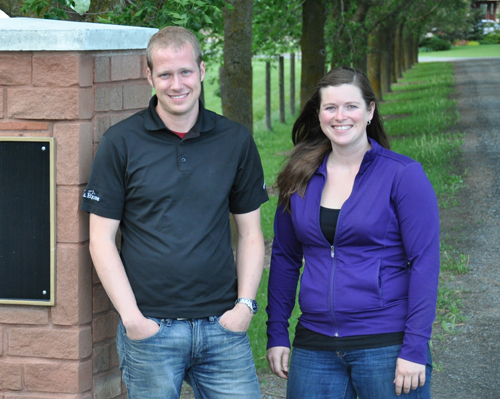
It was early on a Saturday morning when the two-month-old foal named Phoos Boy was found lying in a field, his neck covered in blood. Initially, it was thought that the colt might have been attacked by a coyote or other wild animal, but when he was transported to the Russell Equine Veterinary Services clinic, veterinarian Tiffany Richards, B.Sc. ’05 and DVM ’09, made a startling discovery: the foal had been shot in the neck.
“I saw the huge gaping wound on one side of his neck, but when I looked at the other side and saw the small entry wound, I knew right away he’d been shot,” she says. And she knew caring for him was going to be a challenge: “They don’t really teach you about gunshot wounds in veterinary school.”
Looking at the foal, it was hard to believe he’d survive. “The exit wound tore away the majority of his neck,” says John Adams, B.Sc. ’02 and DVM ’06, another veterinarian in the clinic. Garth Henry, the third partner and original owner, is a 1985 graduate of the Ontario Veterinary College (OVC).
Phoos Boy had actually been born at the clinic, and his mother had been rebred before they were both sent to the trainer’s farm. Less than 24 hours after their arrival at the farm, the foal was found injured.
“I could feel the vertebrae in the wound, and it missed his spinal cord by about half a centimeter,” says Richards. “He was hit in almost the only spot on his neck where it wouldn’t kill him.”
However, the foal was in severe shock and required IV fluids, anti-inflammatory medication and antibiotics. Richards also milked the mare and fed the foal through a tube, since he was unable to lift his head to nurse at first.
The injured colt stayed at the Russell clinic from April to September, receiving daily care and treatments. “He came very close to dying,” says Adams, “but we were able to save him, and today you’d never know he was so badly injured. All he has now is a little bit of a ripple on his neck.”
Richards adds: “His neck is a bit stiffer on that one side, but he had the will to survive. He’s part of the first and only crop of foals from his sire; the sire passed away last year, so the foal is special. We are all hoping he’ll do well.”
Despite a posted reward, the police were never able to determine the identity of the shooter.
That case was one of the more high-profile ones Adams and Richards have been involved in, but they have contributed to the health and well-being of many horses in the Ottawa area.
Adams says he gets his greatest satisfaction from the problem-solving aspects of helping horses who are lame or having performance difficulties. “I just like the challenge,” he says. “I like the puzzle of trying to find out the cause, especially when it turns out to be something unexpected or off-the-wall.
“I’m interested in cases that are a bit different, such as when a horse seems relatively normal most of the time but develops lameness at higher speeds.”
Richards is most interested in breeding. “I do like the other performance work, but I enjoy the science and math that goes into breeding. There’s nothing better than being able to turn to a client after weeks of work and say, yes, your mare is pregnant. And of course, I just love the babies. And I love to see the relationship between the mares and foals; they are fun to watch.”
Both vets are from the Ottawa area and are lifelong horse enthusiasts. Adams’ parents have quarter horses and have competed in rodeos. Adams and his father were successful team ropers. “I just liked the horses,” says the younger Adams, “and when the horses got ill, as horses do from time to time, and we called in the vet, I was fascinated with what the vet was doing.” By the time he was in high school, Adams was volunteering at the clinic where he works today.
Once he was accepted at OVC, he continued to return each summer to work with clinic owner Garth Henry, DVM ’ , other than one summer spent at a clinic in Toronto. A year after graduation, Adams was able to buy into Henry’s practice; Richards became their third partner in 2011.
Richards started riding at age five and competed primarily in hunter classes, with some jumper classes as a teenager. Later she worked in a polo barn before getting a job with the trainer of her father’s standard-bred horses. After doing her third-year placement at Russell Equine, she knew it was a good match.
Historically, Russell Equine Veterinary Services focused on standard-bred racehorses, treating lameness, illnesses and providing breeding services. At one time, about 95 per cent of the horses cared for in the practice were racehorses, and Henry would travel to the racetrack in Montreal several times a week. More recently, the practice has expanded to include more riding horses and they now make up the majority of the animals seen.
“We’d heard the rumblings about taking the slots away from racetracks, and we began to diversify and promote ourselves differently to get away from our reliance on the racing industry,” says Adams. “We’ve made good strides. We’ve been sponsoring local events and getting more involved in local riding groups. The wants and needs of the riding-horse client are quite a bit different than the typical standard-bred client – not better or worse, just different.”
Richards and Adams are enjoying the new challenges of a changing client base and have plans for further expansion. Adams says: “I’ve been contemplating going for a Quebec license as well to be able to expand in that area. My aspiration is to grow the practice even further and bring in more vets.”